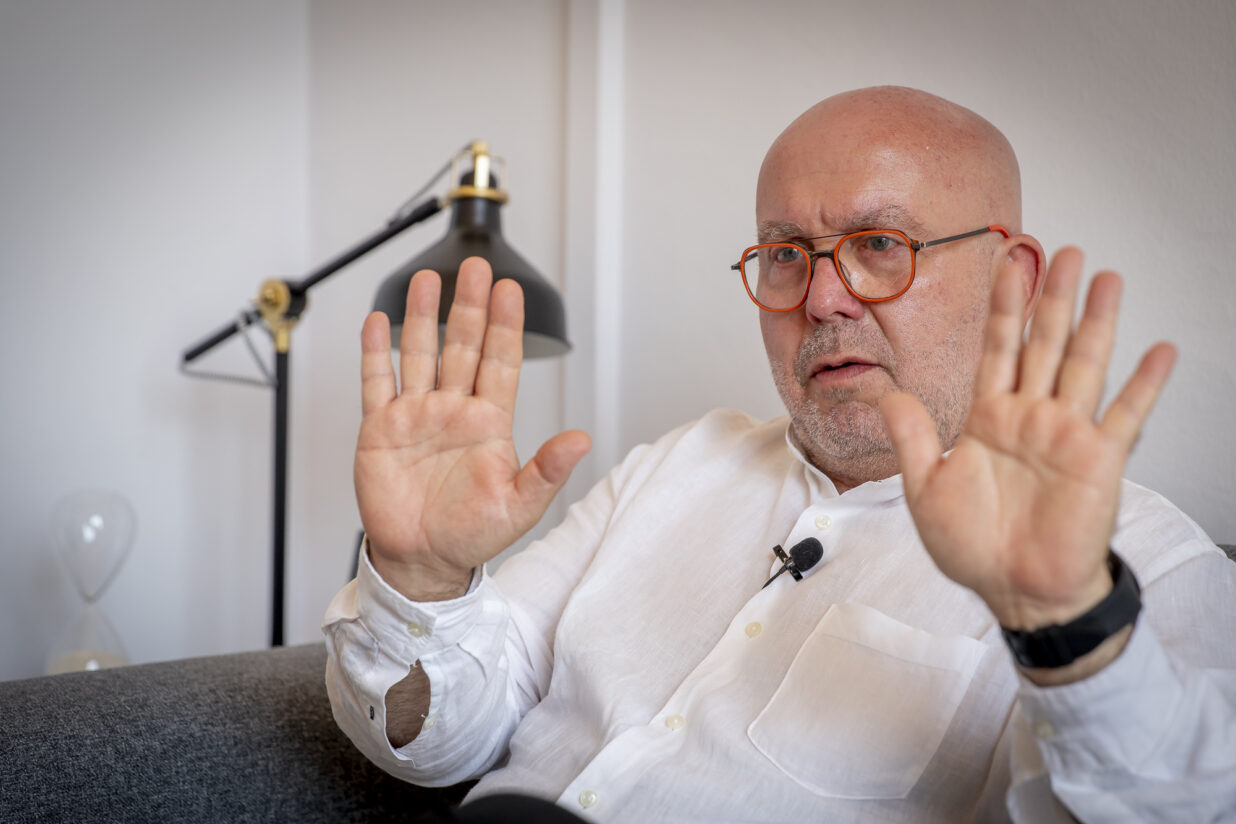15.07.2024 - 03:41
|
Actualització: 15.07.2024 - 03:44
When Gonzalo Boye (Viña del Mar, Chile, 1965) receives us in his office, he looks visibly exhausted. These last weeks have been frenetic, largely due to the legal battle to enforce the amnesty for those who are beneficiaries, such as President Carles Puigdemont, against whom Judge Pablo Llarena maintains an active arrest warrant. What could happen if he returns and is detained? How can the revolt of the Spanish high judiciary be combated? Despite the fatigue, Boye does not lose his firmness in his responses and does not spare harsh or uncomfortable words when he says that Puigdemont could spend a long time in prison if he is detained or if he has to predict that the trial against him, starting in November, could remove him from public life forever.
—What can be done against Llarena, who is breaking the amnesty law with Puigdemont?
—I like to see the glass half full, and I see that there is no longer the consensus in the Supreme Court that existed when the ruling on the process was issued.
—Do you say this because of Judge Ana Ferrer’s dissenting vote?
—Yes, and because of the way Judge Susana Polo has handled the Tsunami Democràtic case. In the most serious case, for terrorism, the judge says: “Listen, the law allows me to take your statement via videoconference, and there is an international legal cooperation mechanism, so I can do it in any EU country.” Llarena, on the other hand, reissues a new arrest and prison order. This is a dissent within the Supreme Court and shows that we are not wrong and, moreover, that probably in this journey Mr. Llarena is not so accompanied.
—But Llarena and Marchena’s vision could prevail.
—They are breaking the rule of law. There is a TSJC resolution that says about embezzlement the same thing that Judge Ana Ferrer said. How will the TSJC resolution, which is final, and the Supreme Court resolution by Llarena coexist in the future? How will they coexist within the same legal system?
—Marchena already invents, in his resolution, an argument to justify amnestying embezzlement for Miquel Buch and Luis Escolá, but not for Puigdemont.
—This is the greatest defeat, having to invent an argument. The best jurists in the Spanish state say that the law says what it says. And then there are others, the last ones from the Philippines, who consider that the law says something else.
—You assume that Puigdemont will be detained when he returns from exile.
—Today, as a jurist, the only thing I know is that there is an arrest and imprisonment order against him.
—As a lawyer, what do you recommend, that he returns discreetly or accompanied by popular mobilization?
—My duty is to inform my client of the consequences of the current order. How to address this order from a legal standpoint is my responsibility; the rest is not.
—If there were a popular mobilization to try to protect Puigdemont from a possible arrest, would there be any legal risk for the demonstrators?
—Why?
—I’m asking you.
—It’s hard for me to think that people would let President Puigdemont be detained just like that. The Catalans are a mobilized people who have shown that if they need to stand firm, they stand firm. I don’t think anyone is thinking about a fine or anything like that.
—If he were detained, what would happen to President Puigdemont?
—He would be brought before a judge, and Judge Llarena would have to decide whether to imprison him. But let’s not forget one thing: this time he only has Vox. It’s the saddest thing I’ve seen in my professional life, that a whole Supreme Court depends on a fascist party to take measures against a democrat.
—But they’ve gotten this far.
—Yes, but they no longer have the prosecution or the state attorney, who have requested the application of the amnesty. They have no one else in this procedure: it’s them and Vox.
—Could it matter where he is detained?
—I think that in President Puigdemont’s case, there will be an attempt to take him to Madrid immediately. If they had detained Bolívar, San Martín, or O’Higgins, they would have put them on a ship and taken them to the metropolis. But they were not detained.
—If so, Vox would request pre-trial detention, and Llarena would imprison him. Could Puigdemont’s pre-trial detention last long?
—Of course, it could last four years. Two years extendable by two. Sustaining a detention in the case of an act that falls within the objective scope of the amnesty is serious. Sustaining imprisonment based on this same act is much more serious; and keeping him in prison is saying “I don’t care about the rule of law.”
—What could you do? Initially, a habeas corpus request?
—We have a series of measures prepared for this scenario, and we will use them when necessary if it comes to that. I always believe that in the end, common sense will prevail.
—Many people are worried that he could end up in prison. They could deactivate him politically.
—For seven years, they have tried to deactivate him as a political figure. Puigdemont in prison is not deactivated.
—But it severely limits his ability to maneuver and move.
—Yes, no one wants him to go to prison. But those who want to imprison him, I think, have not even measured the consequences of doing so.
—From what you say, Puigdemont could spend several months in prison. At least.
—The president has always been aware that there is a risk. He has been exposed to this risk every day for seven years.
—And amid all this, you are informed that in November, the trial in which you are accused of money laundering from drug trafficking will begin.
—It will start on November 18.
—Coincidence?
—I’m not worried about that; I’m worried about going to trial. Because I see the scenario very clearly: what Judge Aguirre did, finding someone to testify against me, is what they did in this case when they released an alleged confessed murderer in exchange for testifying against me. And with that, they have built a case for which I am now going to trial.
—And what do you think could happen?
—They will probably offer absurd sentences to the other defendants to testify against me.
—They are initially asking for nine and a half years in prison for you.
—Nine years and nine months.
—If this trial ends in conviction…
—If this trial ends in conviction, I will spend the rest of my life in prison.
—And you already said a long time ago that you had no intention of going into exile.
—I will face the situation, I am a practicing lawyer, and I will defend myself to the end.
—And the imprisonment would be before the appeal to the Supreme Court?
—I believe that if they sentence me to nine or ten years, I will go to prison and spend the rest of my life in prison, because at my age, it is a life sentence.
—How do you mentally cope with such a possibility?
—I have work to do and no time for whining. I am very aware of what is coming my way, and I have no choice but to keep fighting. Throughout the processing of the amnesty law, all sorts of barbarities have been said about me. I am now going to trial; I am not subject to the amnesty law. And I am going to trial because a prosecutor insisted on it, not because I committed any crime. I am going to trial because there is a prosecutor who should not be a prosecutor, and who, with public resources, has insisted on bringing me to trial and trying to ensure that I spend the rest of my life in prison. Why? Not because of what I do, but because of whom I defend. I had no problems, neither in this case nor in any other, until I defended the leaders of Catalan independence. And I am convinced that they will make me pay this price. Of course, they will make me pay. I am aware, but no one will be able to say that I stopped defending them for a single day.
—Could there have been any way for you to be included in the amnesty law?
—No, I don’t think so. Look, from the moment the law has an objective scope, if it had been accepted that all lawfare was included in the amnesty law, then obviously, yes. But I am not a subject of it. And if I had been, I should not have participated in drafting the law.



